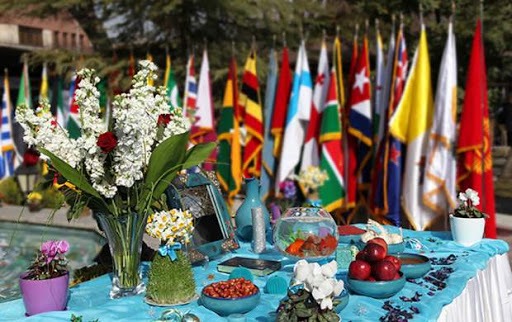The twentieth century has been a century for building civilizations for countries; in this century, given an increase in the number of independent countries in various parts of the world, competition over historical documentation and records has been taken into the consideration of countries when drafting national politics. The issue of cultural and spiritual heritage, after the tangible structural heritage, is being brought under competition as the main heritage of countries. At the present time, most countries are seeking and trying to document their cultural and spiritual heritage and there is a tight competition among countries. The registration of historical and spiritual items of the countries as well as their customs and traditions in UNESCO is part of the duties of governments and nations. For this reason, in the present era, the registration of spiritual items related to the customs and traditions of countries and tribes is on the rise and in fact would lead to the establishment of a system of cultural civilization. And in this connection, competitions and conflicts have taken place in the past. At the present time, any country, on the basis of its historical and geographical status and its civilization, is seeking to make such items tangible for the world and use them for commercial purposes. The issue of tourism is a solution which is considered as one of the most important aspects of the global trade. The financial turnover of the tourism industry exceeds billions of dollars in the world. For this reason, countries try to attract tourists and give identity to their society through reviving their tangible, cultural and spiritual ancient heritage.
For example, when Molana was registered in UNESCO, millions of dollars in tourism revenue were generated for Konya. Other spiritual heritage such as all types of foods, cultures and sports have been registered as spiritual heritage. For this reason, the civilization of Norooz has been heeded by the world as one of the most distinguished civilizations because in the not too far period, two thirds of the whole world was under the influence of the Persian history and civilization as the world’s most ancient global culture. And here, Norooz plays an important role in the history and culture of the world. Peoples of various countries that were part of the ancient Persia in their history celebrate Norooz as part of their spiritual history despite being geographically independent. It is remarkable to mention that countries such as Turkey, Azerbaijan, Armenia, Georgia, Kazakhstan, Tajikistan, Afghanistan, India and many other countries celebrate Norooz as one of their festivals and social events.
In fact Norooz plays the role of a chain that links the Persian-speaking civilization among various countries with diversified race, language and cultures and this is due to the magnificence and strength of Norooz. For this reason, in the contemporary world, countries are seeking a cultural civilization such as Norooz so that they could promote themselves in the world through their culture and history.
Here, every year, presidents of the United States and other big countries such as Russia, China and European countries congratulate Persian speakers on the occasion of Norooz and this indicates the important role Norooz play in the global civilization. However, unfortunately, due to the absence of proper investment in publicizing and introducing Norooz to the world, other countries are trying to impose their spiritual heritage on the civilizational sphere of Norooz in the framework of cultural assault. We witness that the celebration of Christmas is seriously pursued in Iran and according to the figures, Muslim Iranians tend to buy the largest quantity of Christmas items and gifts. Moreover, the celebration of Valentine is promoting in Iran as an imported culture which is replacing the pure Iranian culture.
In this connection, it is remarkable to mention that some relevant authorities have failed to properly promote the status of Norooz and the Iranian culture and civilization and have inadvertently contributed to the spread of the assaulting Western culture in the country in view of their poor performance in promoting Iranian items. This is while if we are able to properly introduce and publicize our Iranian and Islamic history and civilization against the assaulting Western culture, we would make a lot of achievements in various political, economic and cultural domains.
For example, under the present circumstances in which coronavirus has engulfed the whole world and the supply of Covid-19 vaccine has become a major challenge for the world countries, an Iranian who has emigrated to India years ago has come to the rescue of the country and has promised to procure some vaccines for the country; such a measure by this Persian Iranian in India emanates from his interest in his mother land i.e. Greater Persia.
Considering the above, one can say that under the present political and economic conditions of the world today the role of cultural diplomacy is very significant in linking officials and diplomats to expand mutual relations. In the foreign policy which aims to establish and expand political and diplomatic relations, cultural diplomacy and public diplomacy constitute a proper foundation and grounds for the advancement of foreign policy. In this respect, Norooz can play a leading role as one of the world’s main cultural festivals and events. It seems that under the present conditions of the global order, the advancement of a cultural diplomacy on Norooz would result in the expansion of Iran’s international communications. Therefore, it is necessary that relevant authorities consider and follow up the issue of internationalizing Norooz as a ground for the enhancement of diplomatic, political and commercial relations with the world.










0 Comments